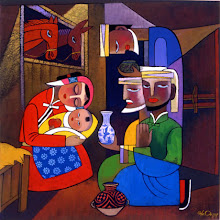The tone of the letter is very positive, appreciative of the "extraordinary potential" that these new technologies make possible. Pope Benedict's words resonate with the experience of many of us, young or old: "Young people, in particular, have grasped the enormous capacity of the new media to foster connectedness, communication and understanding between individuals and communities, and they are turning to them as means of communicating with existing friends, of meeting new friends, of forming communities and networks, of seeking information and news, and of sharing their ideas and opinions. "
In this appreciative context, the Holy Father then highlights three important calls for Christians engaged in these new technologies: first, the promotion of respect for the human person; second, the promotion of dialogue with a certain depth rather than merely superficial contact; and third, the promotion of authentic friendship and of networks of solidarity concerned with global issues such as "peace and justice, human rights and respect for human life and the good of creation."
For Facebook and Multiply users, some of the Pontiff's reflections on "friendship" seem to me to be quite "on-target": "The concept of friendship has enjoyed a renewed prominence in the vocabulary of the new digital social networks that have emerged in the last few years. The concept is one of the noblest achievements of human culture. . . . We should be careful, therefore, never to trivialize the concept or the experience of friendship. It would be sad if our desire to sustain and develop on-line friendships were to be at the cost of our availability to engage with our families, our neighbours and those we meet in the daily reality of our places of work, education and recreation."
The letter ends with a striking invitation to mission, addressed especially to young people: "It falls, in particular, to young people, who have an almost spontaneous affinity for the new means of communication, to take on the responsibility for the evangelization of this "digital continent". Be sure to announce the Gospel to your contemporaries with enthusiasm. You know their fears and their hopes, their aspirations and their disappointments: the greatest gift you can give to them is to share with them the "Good News" of a God who became man, who suffered, died and rose again to save all people. Human hearts are yearning for a world where love endures, where gifts are shared, where unity is built, where freedom finds meaning in truth, and where identity is found in respectful communion. Our faith can respond to these expectations: may you become its heralds!"

